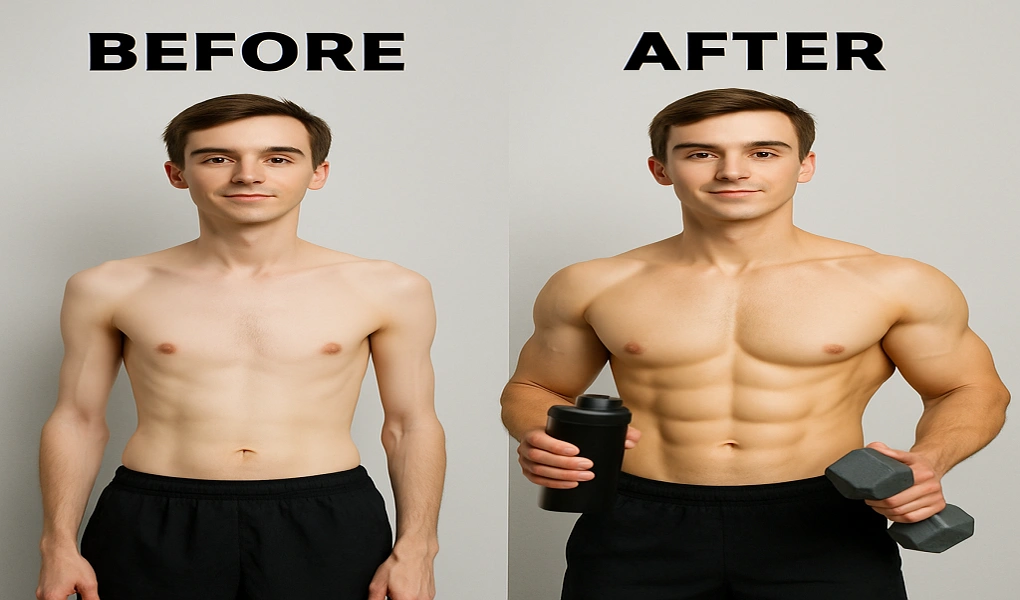Introduction- Why Some People Struggle to Gain Weight
While many people in the United States focus on losing weight, there are some who face the opposite challenge—weight gain. No matter how much they eat, their weight remains low, leaving them frustrated. If you often find yourself saying, “I eat everything, but I still can’t gain weight,” then you’re not alone.
In this expert-reviewed guide, we’ll explore the common reasons behind difficulty gaining weight and share science-backed, effective solutions to help you achieve healthy weight gain safely and naturally.
1. Reasons Why You’re Not Gaining Weight
1.1 High metabolism rate
Some individuals have a naturally fast metabolism, which means their bodies burn calories faster. Even if they eat large meals, their bodies don’t store enough calories, making it difficult to gain weight.
1.2 Genetic reasons
If thinness runs in your family, genetics may play a big role. Studies have shown that body weight and fat distribution can be greatly influenced by inherited traits.
(Source: National Institutes of Health – NIH)
1.3 Nutritional Deficiency
Consuming the right food doesn’t always mean you’re getting the right nutrients. Without adequate protein, complex carbohydrates, and healthy fats, your body can struggle to build muscle and store fat properly.
Refer to Harvard’s Healthy Eating Plate — for a science-based guide on building a balanced meal.
1.4 Digestive Issues
Digestive disorders such as irritable bowel syndrome (IBS), acid reflux, or chronic constipation can interfere with nutrient absorption. If your body isn’t absorbing nutrients efficiently, gaining weight becomes even more challenging.
(Source: Cleveland Clinic)
1.5 Stress and Poor Sleep
High levels of stress and lack of good sleep can disrupt the hormones responsible for appetite, digestion, and muscle recovery. In today’s fast-paced, screen-heavy lifestyle, staying up late hunched over electronic devices can also disrupt healthy eating habits and overall metabolism.
2. Essential Nutrients for Healthy Weight Gain
2.1 Protein
Protein is the key nutrient for building muscle mass and supporting healthy weight gain. Some excellent sources here include:
- Eggs
- Beans and lentils
- Cheese
- Milk
- Tofu and soy products
- Chicken
Note: Choose high-quality proteins to help your body repair and build tissue.
2.2 Healthy Fats
Including healthy fats in your diet helps you increase calorie intake without eating large portions. Sources of healthy fats include:
- Peanut butter
- Avocados
- Nuts (almonds, walnuts, cashews)
- Olive oil
- Coconut oil
2.3 Carbohydrates
Carbohydrates give your body the energy if needs for workouts and activity. Good carb sources include:
- Brown rice
- Quinoa
- Oats
- Potatoes and sweet potatoes
- Whole-grain bread
- Pasta
Complex carbs provide steady energy and support muscle growth.
3. Weight Gain Meal Plan
Junk food and oily snacks are not part of a healthy weight gain plan. Instead, focus on calorie-dense, nutritious meals that fuel your body.
Breakfast
- 1 glass of whole milk or a protein smoothie
- 1-2 bananas
- 3-4 scrambled eggs (or omelet with veggies & cheese)
- A handful of mixed nuts (almonds, walnuts, cashews)
Lunch
- Grilled chicken breast or salmon
- Brown rice or quinoa
- Vegetables steamed (spinach, carrots, and broccoli)
- A bowl of Greek yogurt
- Olive oil, 1 tablespoon, drizzled over salad
Evening Snack
- An almond butter sandwich or toast with peanut butter
- Protein shake or banana smoothie
- Trail mix (nuts + dried fruits)
Dinner
- Grilled fish, turkey, or lean beef
- Sweet potatoes or whole-grain pasta
- Stir-fried vegetables
- A small bowl of cottage cheese (or tofu if vegetarian)
Before Bed\
- 1 glass of warm milk with honey or protein shake
- Almonds soaked in water
Pro Tip:
- Always eat meals every 3-4 hours to maintain a calorie surplus, which is necessary for steady weight gain.
4. The Importance of Exercise for Healthy Weight Gain
You must be thinking, why exercise to gain weight? But doing lightweight training in the gym or at home develops muscles and makes the body fit and attractive. That is why we should keep exercising for 30-40 minutes daily. This will keep our body agile and also increase appetite. Due to which food will get absorbed in the right place in our body.
Benefits of Strength Training:
- Builds muscle rather than fat
- Improves overall body shape
- Naturally increases appetite
- Boosts metabolism for long-term healthy weight
Beginner-Friendly Home Workout (30-40 minutes daily):
- Push-ups: three 15-rep sets
- Squats: three 20-rep sets
- Pull-ups (or assisted pull-ups)—3 sets of 8-10 reps
- Dumbbell exercises (bicep curls, shoulder press)—light to moderate weights
- Hold the plank for 30 to 60 seconds
Tip:
- Start with bodyweight exercises first. Light weights or resistance bands should be gradually added as your strength improves.
5. Sleep & Stress: The Missing Link in Weight Gain
Many people overlook how sleep and stress directly impact weight gain. Without proper rest and a calm mind, your body struggles to build muscle and maintain a healthy weight.
Why Sleep Is Important for Weight Gain
- Muscle repair happens during deep sleep
- An improvement in hormone balance (including testosterone and growth hormone)
- Helps regulate metabolism
- Decreases unneeded fat storage
Aim for:
7–8 hours of quality, uninterrupted sleep every night.
Easy Tips for Better Sleep:
- Keep to a regular bedtime routine.
- Don’t use your phone, TV, or laptop one hour before going to bed.
- Keep your bedroom quiet, cool, and dark.
- Avoid caffeine at night.
How Stress Affects Your Weight:
Cortisol, the stress hormone, is produced by the body when you are constantly stressed.
- Suppresses your appetite at times
- increases fat storage (especially belly fat)
- Disrupts sleep patterns
- Slows muscle development
Simple Ways to Reduce Stress:
- Deep breathing exercises (5 minutes daily)
- Gentle yoga or stretching
- Apps for mindfulness or meditation
- Short nature hikes
- Limit social media scrolling
Remember:
Building weight isn’t just about food — it’s a full-body system that includes your sleep, your mental health, and your overall lifestyle.
6. When Should You See a Doctor for Weight Issues?
While natural remedies and lifestyle changes work for many people, sometimes underlying medical conditions can hinder healthy weight gain. It’s important to consult a healthcare professional if:
Warning Signs You Shouldn’t Ignore:
- You are rapidly losing weight without even trying.
- You’ve been underweight for a long time despite eating well.
- You feel constantly fatigued or weak.
- You frequently have digestive problems like bloating, diarrhea, and constipation.
- Your appetite has decreased significantly.
Possible Medical Conditions That May Affect Weight:
- Thyroid Disorders:
An overactive thyroid (hyperthyroidism) can cause unexplained weight loss. - Digestive Disorders:
IBS, Crohn’s disease, and celiac disease are some of the conditions that can prevent proper nutrient absorption.. - Parasitic Infections:
Intestinal parasites may interfere with digestion and lead to weight loss. - Chronic Illnesses:
Diseases such as tuberculosis (TB), certain cancers, or autoimmune disorders can affect body weight. - Mental Health Issues:
- Anxiety, depression, or eating disorders may reduce appetite and disrupt eating patterns.
Don’t Self-Diagnose
If you’ve tried adjusting your diet and exercise for several months with no results, schedule a visit with your healthcare provider. They might flee.
- Blood tests
- Thyroid function tests
- Stool tests
- Nutrient deficiency screenings
Early diagnosis can help you create a safe, effective treatment plan for healthy weight gain.
Pro Tip:
Always rule out underlying health issues before assuming your weight problem is only diet-related.
7. Effective Home Remedies for Healthy Weight Gain
While some people find success with medical treatment, many find success with simple home remedies that help them gain weight naturally. These remedies are easy and safe and can be incorporated into your daily routine.
7.1 Banana & Milk Smoothie
One of the easiest ans most effective combinations for gaining weight.
How to use:
- One banana is blended with one glass of whole milk.
- For more calories, you can add honey or peanut butter to a tablespoon..
- Drink once or twice daily.
7.2 Nuts, Seeds & Honey
- Honey provides natural sugars and antioxidants, and nuts are high in calories and healthy fats..
How to use:
- Mix a handful of almonds, walnuts, and cashews.
- Add 1–2 teaspoons of raw honey.
- Enjoy as a mid-morning or evening snack.
7.3 Ghee & Jaggery Alternative (US Style Version)
Since jaggery (unrefined sugar) isn’t widely available in the US, you can replace it with natural sweeteners.
How to use:
- Mix 1 teaspoon of clarified butter (ghee) with 1 teaspoon of organic honey or maple syrup.
- Take after meals once daily.
7.4 Avocado—The US Superfood
- Avocados are packed with healthy monounsaturated fats, vitamins, and fiber.
How to use:
- Add sliced avocado to your salads, sandwiches, or breakfast to increase calorie intake without unhealthy fats.
7.5 Protein-Rich Snacks
Include small, frequent snacks rich in protein throughout the day:
- Hard-boiled eggs
- Cottage cheese (or Greek yogurt)
- Protein bars (low sugar, high quality)
- Nut butters (almond butter, peanut butter)
Important Information:
Even though these natural home remedies work, portion control is important. If you want to lose weight, focus on eating a well-balanced diet and avoiding too much sugar and junk food.
8. Types of Thin Body Structure
Not every thin person is the same. Let’s understand the types of thinness so that the treatment can be done properly:
8.1 Skeletal thinness
- Arms and legs are very thin; facial bones are visible.
- Usually there is a serious nutritional deficiency.
8.2 Fit but thin
- They look thin but are energetic.
- This happens with people with high metabolism.
8.3 Tall and thin body
- Height is good, but there is no mass in the body.
- Such people should work on muscle mass.
Solution:
The solution can be different for every type of thinness. Correct identification is necessary.
9. Superfoods That Help You Gain Weight Fast
If you are not able to gain weight even with a normal diet, then definitely add these superfoods:
| Superfood | Benefits | How to take |
| Ashwagandha | Reduces stress, builds muscles | At night with milk |
| Dates | Increases both energy and fat | Eat after soaking them overnight |
| Peanut butter | High calories, rich in protein | In bread or shake |
| Beans and pulses | Plant-based protein | Include it in your daily diet |
| Coconut Water | Hydrates the body and improves digestion | take in the morning |
10. High-Calorie Weight Gain Shakes & Smoothies
Weight Gain Shake Recipe:
Ingredients:
- 1 banana
- 1 glass of milk
- 2 tbsp peanut butter
- 1 tbsp honey
- 5-6 soaked almonds
Put it in a mixer and blend. Take it in the morning and evening.
Conclusion Gain Weight the Healthy Way
If you keep eating throughout the day but do not gain weight, then there is no need to despair. First identify the reason—high metabolism, genetics, lack of nutrition, or digestive problem. After that, include a balanced diet, proper exercise, a stress-free life, and adequate sleep in your routine.
Remember, gaining weight is a journey, not a destination. And it is possible only when you maintain patience and discipline.
References:
- Cleveland Clinic: “Malabsorption Syndromes”
- NIH: “Genetics of Obesity”
- Harvard Health: “Nutrition for Weight Gain”
Read More-

